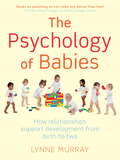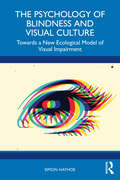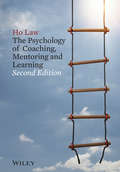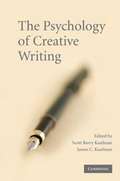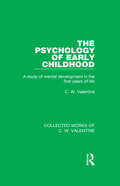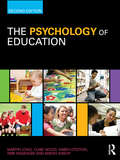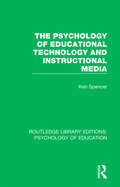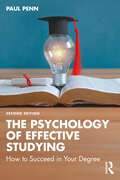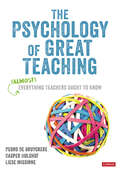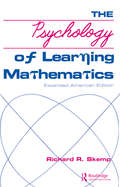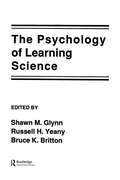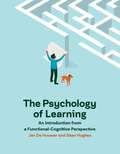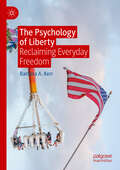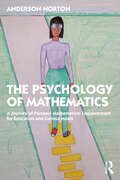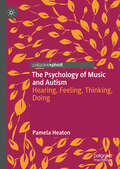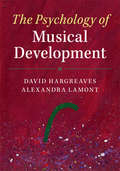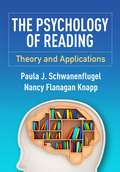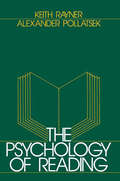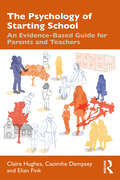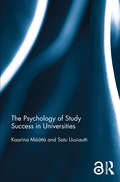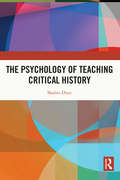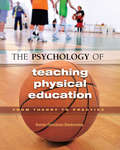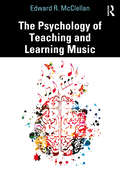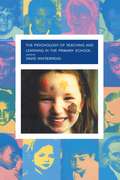- Table View
- List View
The Psychology of Babies: How relationships support development from birth to two
by Lynne MurrayWinner of the British Psychological Society Book Award for Best TextbookAn instructive and accessible account of the psychological development of children aged 0-2 years and how it can be supported by social relationships.The first two years are critical in a child's development, influencing what happens in later childhood and even adulthood. Yet how best to support that early development is not always easy to grasp. Now help is at hand with this expert guide on the care of children through these essential years.Based on the latest research, with its wealth of picture sequences and clear explanations, this book shows how the development of young children's social understanding, attachments, self-control and intelligence can be supported through their relationships.
The Psychology of Blindness and Visual Culture: Towards a New Ecological Model of Visual Impairment
by Simon HayhoeThe Psychology of Blindness and Visual Culture: Towards a New Ecological Model of Visual Impairment advances the debate regarding the inclusion and wellbeing of people with visual impairment (PVI) through looking at the psychological nature of visual culture and its effects on the lived experience. It explores whether it is possible to increase access to visual culture for PVI through language, alternative sensory data or contemporary communication media, and in so doing, questions whether or not communication and culture are intrinsically visual.Occupying a unique field of study by focusing on the understanding of visual culture and visual communication by PVI in real-world settings, this empirical book examines the difference between the understanding of visual culture and visual communication by PVI who acquire their visual impairments late in life and PVI who acquire their visual impairments early in life. Understanding these concepts not only helps us to understand how PVI feel socially included in visual culture, but also how culture and artifacts are conceptualized verbally, culturally and through the senses.It is compelling reading for advanced students of psychology and philosophy, and those studying learning in cultural settings, and in museum studies, computer science, disability studies, education and fine art management.
The Psychology of Coaching, Mentoring and Learning
by Ho LawThe Psychology of Coaching, Mentoring and Learning addresses the psychological principles upon which organizational and industrial coaching and mentoring is based. The new edition of this text is updatd with new research, taking into account the growth of positive psychology and its role in coaching and mentoring. This book is ideal for coaches, mentors, trainers, psychologists, senior executives, managers, and students with an interest in this field.
The Psychology of Creative Writing
by Scott Barry Kaufman James C. KaufmanThe Psychology of Creative Writing takes a scholarly, psychological look at multiple aspects of creative writing, including the creative writer as a person, the text itself, the creative process, the writer's development, the link between creative writing and mental illness, the personality traits of comedy and screen writers, and how to teach creative writing. This book will appeal to psychologists interested in creativity, writers who want to understand more about the magic behind their talents, and educated laypeople who enjoy reading, writing, or both. From scholars to bloggers to artists, The Psychology of Creative Writing has something for everyone.
The Psychology of Early Childhood: A Study of Mental Development in the First Years of Life (Collected Works of C.W. Valentine)
by C.W. ValentineOriginally published in 1942, this title attempted to trace, from their very earliest appearances after birth, all aspects of mental development in childhood up to the age of about 4 or 5. It is based largely on the author’s almost daily observations of his own five children, over a period of some twenty years, supplemented by numerous tests and experiments. The first purpose of this book was to advance our knowledge of the psychology of childhood. The importance of such knowledge had become increasingly recognised. Even if not all is completely determined in the first 4-5 years, there was little doubt by this time that these first years are of profound significance for future development: and the better understanding and training of the young child may be at the root of many of our educational and social problems.
The Psychology of Education
by Kieron Sheehy Martyn Long Clare Wood Karen Littleton Terri PassengerWritten in an accessible and engaging style, this second edition of The Psychology of Education addresses key concepts from psychology which relate to education. Throughout the text the author team emphasise an evidence-based approach, providing practical suggestions to improve learning outcomes, while fictional case studies are used in this new edition to provide students with a sense of what psychological issues can look like in the classroom. Activities around these case studies give students the chance to think about how to apply their theoretical knowledge to these real-world contexts. ‘Key implications’ are drawn out at appropriate points, and throughout the book students are provided with strategies for interrogating evidence. Key terms are glossed throughout the book and chapters are summarised and followed by suggestions for further reading. A chapter on Learning interactions and social worlds is new to this edition. The following chapters have all been extensively updated: Learning Assessment Individual differences and achievement Student engagement and motivation The educational context Society and culture Language Literacy Inclusive education and special educational needs Behaviour problems Dealing with behaviour problems. This book is essential reading for undergraduate students of Education Studies and Psychology as well as trainee teachers on BA, BEd and PGCE courses. It will also be of use to postgraduates training to be educational psychologists.
The Psychology of Educational Technology and Instructional Media (Routledge Library Editions: Psychology of Education)
by Ken SpencerWhat can research in cognitive psychology offer the growth of educational technology and instructional media? Originally published in 1988, this book argues that, for much of its history, educational technology has been concerned with justifying and verifying the basic assumption that the processes and products of technology can improve instructional effectiveness. The result is seen as a systems approach grounded in empiricism and the failure to incorporate much important research in cognitive psychology. The book argues that it is now time for educational technology to come to terms with new ideas in cognitive, and particularly constructivist, psychology and it both advocates and describes the forging of new links between the two disciplines.
The Psychology of Effective Studying: How to Succeed in Your Degree
by Paul PennThis book provides a vital guide for students to key study skills that are instrumental to success at university, covering time management, academic reading and note-taking, academic integrity, preparation of written assignments, teamwork, giving presentations, and revision.Using a combination of research from psychology and practical examples, the author conveys where students often go fundamentally wrong in their studying practices and provides clear and concise advice on how they can improve. This second edition of The Psychology of Effective Studying: How to Succeed in Your Degree is thoroughly revised, containing reflective questions and review quizzes alongside new material addressing critical evaluation, managing exam related stress, and effectively integrating generative AI into studying.Written in an informal and engaging style by an award-winning psychology lecturer, and including examples from popular culture, this is the ideal alternative and accessible study skills resource for students at undergraduate level, as well as any reader interested in how to learn more effectively.
The Psychology of Great Teaching: (Almost) Everything Teachers Ought to Know
by Pedro De Bruyckere Casper Hulshof Liese MissinneThis is your essential teaching companion that offers a broad understanding of modern psychology and how ideas from psychological theory and research can be relevant to any classroom. Explore robust, current ideas and contemporary findings from different psychological disciplines, such as cognitive psychology, developmental psychology, social psychology, personality theory and systems theory, and learn new insights to enhance your teaching. Deepen your knowledge of how students and young people develop as individuals and how a greater understanding of human behaviour can make you a more effective teacher. Each chapter includes ‘teacher takeaways’ offering practical advice on how to translate up-to-date psychological ideas into effective teaching techniques. The perfect read for teachers and those training to teach school students of any age. Pedro De Bruyckere is an educational scientist at the Artevelde University College of Applied Sciences and Leiden University. Casper Hulshof is a psychologist who teaches Educational Science at Utrecht University. Liese Missinne is an educational scientist and teacher trainer at the Artevelde University College of Applied Sciences.
The Psychology of Great Teaching: (Almost) Everything Teachers Ought to Know
by Pedro De Bruyckere Casper Hulshof Liese MissinneThis is your essential teaching companion that offers a broad understanding of modern psychology and how ideas from psychological theory and research can be relevant to any classroom. Explore robust, current ideas and contemporary findings from different psychological disciplines, such as cognitive psychology, developmental psychology, social psychology, personality theory and systems theory, and learn new insights to enhance your teaching. Deepen your knowledge of how students and young people develop as individuals and how a greater understanding of human behaviour can make you a more effective teacher. Each chapter includes ‘teacher takeaways’ offering practical advice on how to translate up-to-date psychological ideas into effective teaching techniques. The perfect read for teachers and those training to teach school students of any age. Pedro De Bruyckere is an educational scientist at the Artevelde University College of Applied Sciences and Leiden University. Casper Hulshof is a psychologist who teaches Educational Science at Utrecht University. Liese Missinne is an educational scientist and teacher trainer at the Artevelde University College of Applied Sciences.
The Psychology of Learning Mathematics: Expanded American Edition (Pelican Ser.)
by Richard R. SkempThis classic text presents problems of learning and teaching mathematics from both a psychological and mathematical perspective. The Psychology of Learning Mathematics, already translated into six languages (including Chinese and Japanese), has been revised for this American Edition to include the author's most recent findings on the formation of mathematical concepts, different kinds of imagery, interpersonal and emotional factors, and a new model of intelligence. The author contends that progress in the areas of learning and teaching mathematics can only be made when such factors as the abstract and hierarchical nature of mathematics, the relation to mathematical symbolism and the distinction between intelligent learning and rote memorization are taken into account and instituted in the classroom.
The Psychology of Learning Science
by Bruce K. Britton Shawn M. Glynn Russell H. YeanyFocusing on the teaching and learning of science concepts at the elementary and high school levels, this volume bridges the gap between state-of-the-art research and classroom practice in science education. The contributors -- science educators, cognitive scientists, and psychologists -- draw clear connections between theory, research, and instructional application, with the ultimate goal of improving science teachers' effectiveness in the classroom. Toward this end, explicit models, illustrations, and examples drawn from actual science classes are included.
The Psychology of Learning: An Introduction from a Functional-Cognitive Perspective
by Sean Hughes Jan De HouwerAn introduction to the psychology of learning that summarizes and integrates findings from both functional psychology and cognitive psychology.Learning unites all living creatures, from simple microbes to complex human beings. But what is learning? And how does it work? For over a century, psychologists have considered such questions. Behavior analysts examined the ways in which the environment shapes behavior, whereas cognitive scientists have sought to understand the mental processes that enable us to learn. This book offers an introduction to the psychology of learning that draws on the key findings and major insights from both functional (behavior analysis) and cognitive approaches.
The Psychology of Liberty: Reclaiming Everyday Freedom
by Barbara A. KerrThis book introduces a new concept of liberty, based on the idea that being free means being the humans we evolved to be in our first 200,000 years. With perspectives from psychology, anthropology, and sociology, the author shows how throughout history, dominant individuals and status hierarchies have injured our psychological and physical well-being. Readers discover simple behaviors that make humans feel free (like gossiping, playing, making, and storytelling) and are prompted to a compelling reflection threats to this freedom. Psychology of Liberty: Reclaiming Everyday Freedom explores the dynamics of creative families, communities, and societies, showing how they sustain human freedom. The author identifies new pathways to freedom, drawing from examples of resistance to authoritarianism. In this timely and ambitious book, the author combines personal narrative with academic research to make complex ideas accessible.
The Psychology of Mathematics: A Journey of Personal Mathematical Empowerment for Educators and Curious Minds
by Anderson NortonThis book offers an innovative introduction to the psychological basis of mathematics and the nature of mathematical thinking and learning, using an approach that empowers students by fostering their own construction of mathematical structures. Through accessible and engaging writing, award-winning mathematician and educator Anderson Norton reframes mathematics as something that exists first in the minds of students, rather than something that exists first in a textbook. By exploring the psychological basis for mathematics at every level—including geometry, algebra, calculus, complex analysis, and more—Norton unlocks students’ personal power to construct mathematical objects based on their own mental activity and illustrates the power of mathematics in organizing the world as we know it. Including reflections and activities designed to inspire awareness of the mental actions and processes coordinated in practicing mathematics, the book is geared toward current and future secondary and elementary mathematics teachers who will empower the next generation of mathematicians and STEM majors. Those interested in the history and philosophy that underpins mathematics will also benefit from this book, as well as those informed and curious minds attentive to the human experience more generally.
The Psychology of Music and Autism: Hearing, Feeling, Thinking, Doing
by Pamela HeatonThis book considers the cognitive, behavioural and socio-emotional aspects of autism in relation to music perception, musical engagement and music production. Musicality is considered from an evolutionary perspective and in relation to psychological models of autism. In drawing together literature on autism and music neuroscience with original case studies from musicians with autism, the book seeks to broaden our understanding of typical and atypical musical experience and sets a new agenda for multi-disciplinary research in this area. It provides a unique resource that will appeal to students and scholars of Autism Spectrum Disorder, neurodevelopmental conditions, music psychology and neuroscience, music therapy, music education and inclusive education; as well as to practitioners and general readers.
The Psychology of Musical Development
by David Hargreaves Alexandra LamontThe Psychology of Musical Development provides an up-to-date and comprehensive account of the latest theory, empirical research and applications in the study of musical development, an important and emerging field of music psychology. After considering how people now engage with music in the digital world, and reviewing current advances in developmental and music psychology, Hargreaves and Lamont compare ten major theoretical approaches in this field - including cognitive stage models and neuroscientific, ecological and social cognitive approaches - and assess how successfully each of these deals with five critical theoretical issues. Individual chapters deal next with cognition, perception and learning; social development; environmental influences on ability, achievement and motivation; identity, personality and lifestyle; affect and emotion; and well-being and health. With an emphasis on practical applications throughout, this book will be essential reading for students and scholars of music psychology, developmental psychology, music education and music therapy.
The Psychology of Reading
by PhD Paula J. Schwanenflugel Nancy Flanagan KnappIncorporating cognitive, neuropsychological, and sociocultural perspectives, this authoritative text explains the psychological processes involved in reading and describes applications for educational practice. The book follows a clear developmental sequence, from the impact of the early family environment through the acquisition of emergent literacy skills and the increasingly complex abilities required for word recognition, reading fluency, vocabulary growth, and text comprehension. Linguistic and cultural factors in individual reading differences are examined, as are psychological dimensions of reading motivation and the personal and societal benefits of reading. Pedagogical Features: *End-of-chapter discussion questions and suggestions for further reading. *Explicit linkages among theory, research, standards (including the Common Core State Standards), and instruction. *Engaging case studies at the beginning of each chapter. *Technology Toolbox features exploring the pros and cons of computer-assisted learning.
The Psychology of Reading: A Special Issue Of The European Journal Of Cognitive Psychology (Oxford Library Of Psychology)
by Keith Rayner Alexander PollatsekThe last 20 years have witnessed a revolution in reading research. Cognitive psychologists, using high-speed computers to aid in the collection and analysis of data, have developed tools that have begun to answer questions that were previously thought unanswerable. These tools allow for a "chronometric," or moment-to-moment, analysis of the reading process. Foremost among them is the use of the record of eye movements to help reveal the underlying perceptual and cognitive processes of reading. This volume provides a coherent framework for the research accomplished on the reading process over the past 15 years. It emphasizes how readers go about extracting information from the printed page and how they comprehend the text.
The Psychology of Starting School: An Evidence-Based Guide for Parents and Teachers
by Claire Hughes Caoimhe Dempsey Elian FinkThe Psychology of Starting School offers a highly accessible, practical guide to cutting-edge research from developmental science to guide parents and professionals through this exciting but sometimes tricky period.Written by expert developmental psychologists, it explores how social and emotional competence emerges within a network of supportive relationships and explains how the transition to school compares with other key transitions for children, for example, becoming a sibling. Addressing the all-important topic of children’s early friendships, it explains how children’s mindreading skills and ability to regulate their feelings and behaviour contribute to a successful school transition. The book offers guidance on topics such as successful home-school links, the impact of starting school on family life and troubleshooting problems for both parents and educators including socialising outside school, children’s fatigue, and establishing positive relationships with other parents at the school gates.Designed to dip in and out, and complete with numerous examples, chapter summaries and top tips for parents and teachers, this book is essential reading for parents, Early Years professionals, SENDCos, health visitors and school nurses, as well as mental health professionals and social workers working with children and families.
The Psychology of Study Success in Universities
by Satu Uusiautti Kaarina MaattaUniversities around the world are under increasing pressure to maintain high levels of graduation and to make study processes as efficient as possible, with teachers and students struggling to meet the expectations placed upon them as a result. The Psychology of Study Success in Universities asks whether it is possible to meet these demands at the same time as protecting the well-being of students. Drawing on an extensive and detailed analysis of study success in universities in Finland, the authors of this thought-provoking work argue that universities should be more concerned with students’ satisfaction and place greater weight on students’ perceptions of the elements that enhance or hinder their success. The book provides a multi-dimensional picture of the student-related and teaching-related factors that promote study success. Giving voice to graduate students, including those enrolled on a PhD, the authors look at the resources that students have at their disposal in order to establish what inspires and motivates the students, what slows them down, and what kinds of experiences students have of successful studies. Määttä and Uusiautti present a wealth of high-quality research showing that good teaching and successful study processes can be secured by immediate and caring interaction, flexible and student-centred teaching and supervision, and interdisciplinary collaboration between teachers. The Psychology of Study Success in Universities is essential reading for academics, researchers and postgraduate students in the fields of education and psychology, as well as for those interested in positive psychology, student well-being and pedagogical studies.
The Psychology of Teaching Critical History
by Shalini DixitThis book delves into the psychology of teaching and learning history. It provides insight into the cognitive processes by which individuals imbibe history and how identity associations can shape our interpretation of histories. It assimilates concepts such as political scenario, curriculum, and pedagogy to give a holistic understanding of the processes involved in the learning of history. It discusses various themes such as the instrumentality of history in nation-building; psychological features and development of Historical Understanding; and the marginalisation of community history. It also provides suggestions on how teachers can reconcile with the developmental stages and multiple versions of history, while teaching tolerance and acceptance without compromising on nation-building commitments. An important contribution, this volume will be indispensable for students and researchers of education, history, psychology, and educational psychology. It will also be of interest to historians, teachers and teacher educators.
The Psychology of Teaching Physical Education: From Theory to Practice
by Bonnie BlankenshipThis book weaves together theory, research, and practical information related to the psychological aspects of physical education. Unlike other exercise/sport psychology books on the market, The Psychology of Teaching Physical Education is written especially for future and practicing physical educators and focuses on the psychological principles and strategies that are most relevant to them. The book covers the important topics of motivation, reinforcement, feedback, modeling, prosocial behaviors/moral development, and self-perception. In each chapter, narratives about real practicing teachers show how they apply the principles and theories of psychology to physical education, and particularly to actual situations that readers are likely to encounter professionally. Each chapter contains three main sections: following an opening scenario in which Blankenship captures the reader's attention with a real-life problem, the author then (1) highlights theories related to the subject matter of the chapter, (2) summarizes the research that has been conducted on the theories and the chapter topic, and (3) gives examples of practical applications of the theory and research to physical education. Throughout the chapter, as the theory, research, and application of the topic are discussed, Blankenship presents possible solutions to the challenge presented in the chapter-opening vignette. The classroom applications and real-world examples are relevant to many different physical education settings, including those at the elementary, middle, and high school levels, in both urban and rural schools representing various geographical regions of the country. These examples bring the theories to life and help readers envision how their own classes will benefit as they apply what theyÃve learned about the psychology of teaching physical education. Key Features of the Book A theory-to-research-to-practice approach. An author whose background in both sport psychology and physical education makes her uniquely qualified to write this book. Chapter-ending application exercises that encourage readers to go beyond rote memorization of concepts and principles to apply what they learned in various specific examples. Sample instructional models and guidelines to enable readers to incorporate concepts discussed in the chapter into their own classes. A comprehensive glossary.
The Psychology of Teaching and Learning Music
by Edward R. McClellanThe Psychology of Teaching and Learning Music introduces readers to the key theoretical principles, concepts, and research findings about learning and how these concepts and principles can be applied in the music classroom. Beginning with an overview of the study of teaching and learning, and moving through applying theory to practice, and reflective practice in the process of personal growth, this text focuses on music learning theories, behavioral approaches, cognitive, social-cognitive development, and constructive views of learning. It includes culture and community, learning differences, motivation, effective curricular design, assessment, and how to create learning environments, illustrated by practical case studies, projects, exercises, and photos. Showing students how to apply the psychology theory and research in practice as music educators, this book provides a valuable resource for undergraduate and graduate music education students and faculty.
The Psychology of Teaching and Learning in the Primary School
by David WhitebreadThis book reviews recent work in psychology which sheds new light on important areas of concern to primary school teachers, providing clear guidelines for good practice. The Psychology of Teaching and Learning in the Primary School details the current controversies regarding the effective teaching of reading and numeracy, how to deal with emotional and behavioural difficulties, the best methods of assessing learning, as well as teaching children to think and develop their creativity.It is a useful text for tutors and students on initial teacher training courses, and to teachers involved in professional development.Each chapter contains an editor's summary, a list of further reading, a full list of references and activities to develop and deepen the readers' understanding in each area. At the same time, the book is written in an accessible style ideal for the non-psychologist and is well illustrated with practical classroom examples.
